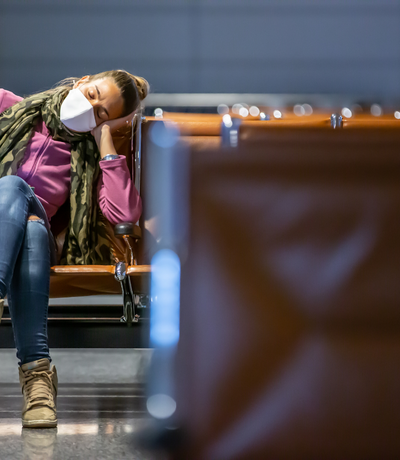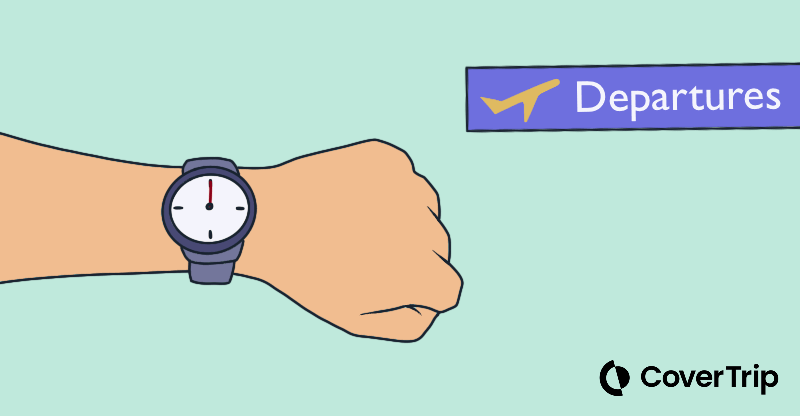How to Handle Travel Disruptions Like a Pro
3 October 2025
The federal government has shut down, and while TSA agents and air traffic controllers are classified as “essential” and must continue working, they won’t receive paychecks until the shutdown ends. History shows this leads to increased sick calls, longer security lines, and flight delays that ripple throughout the entire aviation system.
According to the latest Air Travel Consumer Report, even before the shutdown, only 76% of flights arrived on time.
The key to surviving travel disruptions isn’t luck – it’s knowing your rights, having backup plans ready, and making smart decisions under pressure.
Whether you’re facing government-induced staffing shortages, mechanical issues, or any other delay, understanding what airlines actually owe you and when to cut your losses can mean the difference between a minor inconvenience and a travel nightmare. Here’s your complete guide to protecting yourself and making the best decisions when everything goes wrong.

How to Prepare for Travel Disruptions Before They Strike
The best time to prepare for travel disruptions is before you book your ticket, not when you’re stranded at the airport. Savvy travelers build protection into their plans from the start, giving themselves options when weather, mechanical issues, or government shutdowns throw everything into chaos.
Strategic booking decisions that protect you:
- Book the first flight of the day – it’s less likely to be delayed by cascading problems from earlier flights
- Choose nonstop routes whenever possible – every connection is another opportunity for chaos
- Build buffer days into your itinerary, especially for critical events like cruises or weddings
- Always book directly with airlines rather than third-party sites for easier changes and refunds
- Purchase a travel insurance plan that covers trip cancellations and delays
Financial protection that’s worth having:
- Invest in comprehensive travel insurance that covers weather delays, not just cancellations (read the fine print carefully)
- Use credit cards with built-in trip delay protection – many premium cards reimburse meals and hotels after 6-12 hour delays
- Check if your card offers trip cancellation/interruption insurance when you book travel with it, but don’t rely on it completely
- Keep your airline loyalty status active – elite members get priority rebooking during mass disruptions
Tools to stay ahead of problems:
- Download your airline’s app before travel – it’s faster than calling or waiting in line at the gate, and the chat features have really improved!
- Check your flight status using FlightAware and watch the airline app for real-time delay notifications
- Screenshot your boarding passes and confirmation numbers in case apps fail during disruptions
Keep your bags with you unless you must check them. Checking your bag adds further delay if you need to make changes on the spot.
If you must check your bag: Always carry essential medications, a change of clothes, your phone charger, and important documents in your carry-on. If you’re separated from your checked bag during rebooking chaos, you’ll have what you need to keep going.
Understanding Your Rights: What Airlines Actually Owe You (and what they don’t)
Not all delays are created equal in the eyes of airlines, and understanding the difference between what you’re legally entitled to versus what airlines might offer out of goodwill can save you hours of frustration. US airlines have fewer legal obligations than their European counterparts, but knowing exactly what you can demand makes all the difference when you’re stuck.
When airlines MUST help you (airline-caused disruptions):
- Mechanical issues, crew shortages, or overbooking – airlines are required to rebook you on their next available flight at no charge
- You’re entitled to ask for rebooking on a competitor airline if that gets you there faster
- Many airlines will provide meal vouchers for delays over 3 hours and hotel accommodations for overnight delays
- If you’re involuntarily bumped from an oversold flight, and it results in a delay in your arrival, you’re entitled to cash compensation (up to $1,550, depending on delay length)
When airlines have NO legal obligation (but might still help):
- Weather delays, air traffic control issues, or security threats – airlines aren’t required to provide compensation
- However, many will still rebook you for free on their next available flight
- Hotel and meal vouchers are at the airline’s discretion – always ask, but don’t expect them
- Your credit card trip delay insurance may cover these costs even when airlines won’t
Government shutdown complications:
- TSA agents and air traffic controllers are considered “essential” and must work, but without pay
- Expect longer security lines as some TSA workers call in because they don’t get paid during a shutdown either
- Air traffic control may operate with reduced staff, causing delays and cancellations
- These delays are treated like weather – airlines have no compensation obligations
International flight protections (EU261 rules):
- Flights departing from EU countries have much stronger passenger protections
- You may be entitled to €250-€600 in cash compensation for delays over 3 hours (depending on distance)
- Airlines must provide meals, refreshments, and hotel accommodations regardless of the delay cause
- These rules apply to any airline flying FROM the EU, even US carriers
Pro tip: Don’t accept vouchers or future travel credits without asking about cash compensation first. Vouchers have to be used within a period of time (usually a year). Airlines often offer vouchers, hoping you won’t know you’re entitled to money, especially on international flights covered by EU261 regulations.
Immediate Steps to Take When a Disruption Occurs
The first 30 minutes after learning about a disruption are critical. While other passengers are standing in shock or getting in line, you need to take action on multiple fronts simultaneously. Speed and strategy matter when hundreds of travelers are competing for limited seats on alternative flights.
Your multi-channel rebooking strategy (it helps if you have two phones working at once):
- Immediately open your airline’s app and start searching for alternative flights – don’t wait for an agent – and check nearby alternate airports
- Use the airline’s chat feature to get someone’s attention
- Try calling the airline’s international desk – they’re often less busy than the main customer service line
- If you have elite status or flew in premium class, you can access the staff at the airport lounges for faster service
- Consider tweeting at the airline’s customer service handle – social media teams sometimes respond faster than phone agents
- Check ground transportation options (trains, rental cars) if your destination is within a few hours’ drive
Essential information to have ready:
- Your confirmation number and frequent flyer number
- Your final destination and any acceptable alternative airports nearby
- Your flexibility – can you leave earlier/later, take connections, fly into different cities?
Pro tip: If you’re traveling with a companion, divide and conquer – one person looks for alternate flights and nearby airports, the other works the chat. Whoever gets through first can rebook both passengers, potentially saving hours.
Making the Stay vs. Go Decision
Sometimes, the smartest move is to cut your losses and abandon your original plans, but that decision gets harder when you’ve already invested money and emotion into your trip. Here’s how to make a rational assessment when everything feels chaotic and you’re running on stress and airport coffee.
Assess the realistic timeline:
- Check real-time airport status on FlightAware – not just what the airline is telling you
- Look at weather forecasts for your departure and destination airports over the next 12-24 hours
- If you’re seeing “delayed” change to “delayed again” repeatedly, that’s a red flag that the airline doesn’t know when you’ll leave
- Ask gate agents directly: “What’s causing this delay and when do you realistically expect it to be resolved?”
- Check if other airlines are experiencing the same problems – if everyone’s grounded, weather is likely the culprit
Calculate the actual cost of waiting vs. leaving:
- Add up what you’ll lose: prepaid hotels, event tickets, cruise departures, connecting flights
- Factor in what waiting costs: airport meals, potential overnight hotels, missed work days
- Consider the domino effect – if this delay makes you miss a connection, how much harder does your journey become?
- Ask yourself honestly: Is this trip still worth it if I arrive a day late and exhausted?
When to abandon ship and head home:
- You’re facing multiple delays with no clear resolution timeline
- Weather forecasts show conditions worsening, not improving
- You’ve already missed the main event (wedding, cruise departure, conference)
- Your stress level is affecting your health – sometimes peace of mind is worth more than the trip
When it’s worth waiting it out:
- The delay is measured in hours, not days
- You have flexibility at your destination (no time-sensitive events)
- The airline is providing meal vouchers and hotel accommodations
- Alternative routing would cost significantly more or take much longer
- Weather forecasts show conditions improving within a reasonable timeframe
Pro tip: If you decide to cancel and go home, ask the airline for a refund before you leave the airport.
Ask for documentation of the delay—you may have recovered your airfare, but if you have nonrefundable hotel rooms, you’ll need the documentation to make a travel insurance claim.
Damian Tysdal is the founder of CoverTrip, and is a licensed agent for travel insurance (MA 1883287). He believes travel insurance should be easier to understand, and started the first travel insurance blog in 2006.
